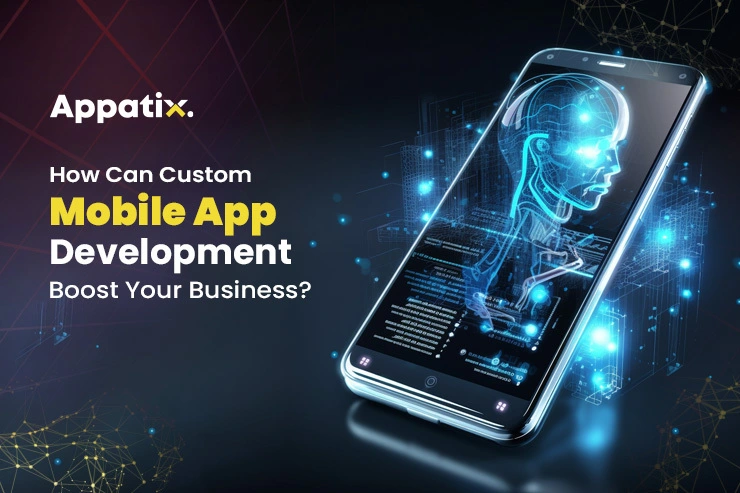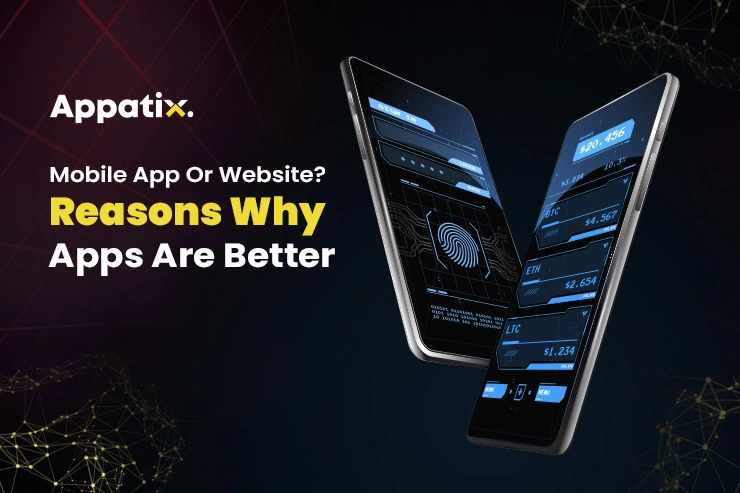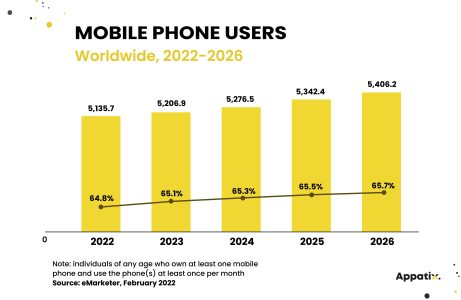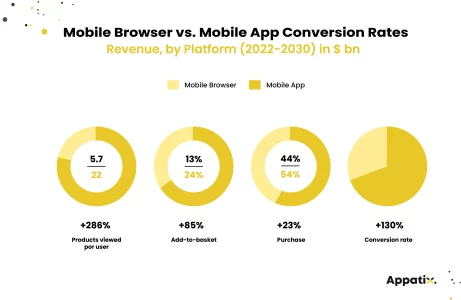
How Long Does It Take To Develop A Mobile App?
The most common question asked is, “How long does it take to build an app?” when it comes to mobile...

It’s a mobile era, and a huge number of the population is mobile users rather than desktop users! About 6.6 billion individuals owned smartphones in 2022, comprising 83.32% of all smartphone subscriptions. According to marketer’s forecasts, mobile phone users will keep experiencing an increase until 2032 and beyond. With a significant increase from 2022 to 2023 by 0.3% more, with 5206.9 million users globally in 2023, it is forecasted that we will see an increase of 5,406.2 million users till 2026.
 Source: groovetechnology
Source: groovetechnology
Subsequently, businesses have appreciated the necessity to appeal to customers by efficiently using mobile channels, but, of course, more is needed. Mobile apps and website optimization are required to enhance and make user experience better, besides exceeding their conversion rates to make the most out of this channel.
While some businesses utilize both mobile websites and apps, other companies might choose one out of the two. The choice between mobile apps and websites is impacted based on the cost, required features, usability, and the audience they serve. But let’s just discuss first:
A mobile website links numerous pages using a web browser while adapting sizes to fit the smaller screen and the touch-supported interface. Websites can aid with a variety of resolutions to deliver content involving contact and product information, blogs, and buying options. Users need an internet connection to get access to the website.
Apps are downloaded over a device. Some apps require an internet connection, while other apps do not. Numerous software companies create their product app versions, such as Microsoft Teams or Salesforce, to allow people to use the software functionality over mobile devices.
Mobile application development comprises writing software for hand-seized devices, taking advantage of mobile devices’ exclusive features, such as the accelerometer tracking different motions such as rotating, shaking, swinging, or tilting a device to alter the app’s coordination.
Users can download apps from their owned device stores, such as Google Play or Apple’s App Store.
Apps allow companies to customize their product’s communications and functionalities, including organizing or revising accounts for the user. Think of these tasks as online banking. Some apps can be logged from anywhere, either with or without an internet connection, while other apps need internet access.
Companies allow sending push notifications to users having an app on their devices and if a user has provided permission by choosing “on” in the Get notifications from Apps section in the device Settings. Push notifications serve as a platform to contact users directly for updates, reminders, and communication over features and promotions.
Studies show that users go for mobile apps more than mobile websites due to a solid reason for building mobile apps to reach out to prospective and present customers.
Additionally, several other reasons make mobile apps better than mobile websites, and below are our picks
Personalization targets to offer personalized communication to users centered on their interests, usage behavior, location, and more.
Mobile apps make treating users easy with a tailored experience. The use of the mobile app A/B testing tool allows for testing out diverse customer experiences.
Mobile apps allow users to raise their inclinations at the beginning, based on which users can get assistance using customized content. Apps also allow customer engagement tracking and then utilizing it to offer custom directions and updates to the users. Moreover, they can also specify the user’s location in real time while providing geography-specific content.
However, improved user experience is not the only reason that comes with personalization. It also assists in improving the app’s conversion rate.
Pampering users with personalized content increases the chances of them converting into potential clients due to providing a human touch, in contrast with generic content delivering more of a robotic or automated touch.
For the last couple of decades, email has been the most broadly-used business communication tool. Businesses own broadly used email (some almost abused it) to reach their users. Accordingly, email has lost the efficiency it once owned, and now its open rates and click rates have continuously fallen.
Well, there’s no reason for concern.
Mobile app notifications come in two types: push notifications and in-app notifications. Both are exhilarating alternatives for collaborating with app users in a far less invasive manner.
The ability to send immediate, non-invasive notifications to users is so useful that it is one of the key reasons why many businesses want to own a mobile app in the first place.
In-app notifications are referred to as the notifications that users can only get when they open an app. However, push notifications are those notifications that users can receive irrespective of any activity they are doing on their mobile devices.
There have been examples where the push medium of notifications has provided 40% of click-through rates. If you choose a mobile website or already own one while building an app, you can send your push notifications with VWO Engage.
Collaborate with customers better through the app's wider scope
Contact Appatix Now!
Mobile apps have the benefits of utilizing mobile device features such as a camera, GPS, contact list, accelerometer, phone calls, compass, etc.
Such device features, when utilized within an app, provide an interactive and fun user experience.
Furthermore, such features can also diminish the efforts users would have to make otherwise. For instance, users filling out a form on a banking app must also submit their photographs for the process completion. The app can allow users to use their mobile camera for taking and submitting photographs.
The interconnected features considerably condensed the time consumed to accomplish a specific task in an app with boosted conversions.
Note: Mobile websites also include some mobile features like cameras, GPS, etc. Still, there are technical restrictions and privacy concerns when it comes to the use of the device’s multimedia features (which mobile apps can use).
It is probably the most central difference between a mobile website and an app. Like a website, apps need internet connectivity to perform most of the tasks, but here’s the difference: an app can still provide basic content and functionality to users even in an offline mode.
Take an example of a banking app again.
The app can provide features like installment calculation, tax calculation, and loan limit determination. Such features can function even without the help of an internet connection.
Note: Even though mobile websites can utilize load web page caching without an internet connection, only limited functions are offered.
With all the technological progressions in web designing, mobile websites still need to depend on browsers to perform even the most basic functions. Mobile websites basically depend on browser features like ‘refresh button,’ ‘back button,’ and ‘address bar’ to function.
Mobile apps, though, don’t have any of such limitations.
A mobile app is designed with numerous explained functions based on radical gestures like ‘swipe,’ ‘tap,’ ‘drag,’ ‘hold, ’pinch,’ and more.
Apps can utilize these gestures to offer advanced functionality, helping users perform tasks better. For instance, an app allows users to move to the next or previous step through the swipe gesture.
Since a mobile app differs from a company’s website, it has the Freedom to offer a new brand experience to users. It allows the company to assess new branding techniques and styles for the app, which can be different from the company website’s regular brand style or the company altogether.
By stepping further, companies can craft mobile apps precisely to evolve into a new brand style for themselves.
Moreover, a mobile app also allows users to customize its exterior, as per users’ preference, which can further help with app-front personalization.
Note that the concept of microsites works on similar ranks. Microsites offer diverse brand experiences to users as compared to their parent sites. They are often used to support an event, a sub-brand, or a newly-released service.
According to internet resources, mobile users usually consume 88% of their time on mobile apps and 12% of their time on mobile websites.
Note: Consider here that users consume the majority of their time on social media apps and gaming apps.
If you anticipate maximizing conversions, then mobile apps can allow an easy way to push users down the conversion funnel.
Mobile apps can be utilized to obtain both bottom-of-the-funnel (BoFu) and top-of-the-funnel (ToFu) users.
For example, utility apps can help fetch in ToFu users that can be later encouraged into BoFu leads. Alternatively, apps like eCommerce already own BoFu users, holding a higher converting probability.
 Source: simublade
Source: simublade
Add-on: Since mobile apps are much more directed in nature (through their content and utility), you can utilize them to tap particular users within the funnel. Mobile websites, in comparison, reach out to a varied set of audiences.
Users spend a significant amount of their time on mobile devices. It can be said that many users come across the apps they’ve installed on their devices almost every day. This consistent encounter turns out to be a chance for the app’s branding.
Even when users are not energetically using a mobile app, they get prompted by the brand linked with the app. The app icon acts like the brand’s mini-ad.
The app’s presence on any device aids by intuitively influencing the user’s awareness of that brand.
This user behavior seeks encouragement from the Signal Detection Theory, suggesting that user’s processes, even those ads previously, have been ignored at some level in their minds.
A well-designed mobile app can perform tasks and accomplish goals much faster than a mobile website. Apps usually store their data close by on mobile devices, compared to the websites that normally use web servers. For this reason, data recovery occurs promptly in mobile apps.
Additionally, apps can save users’ time by keeping their preferences and compelling proactive actions in users’ regard.
There is also a technical explanation as to why mobile apps can work quickly. Mobile websites use JavaScript code to accomplish most of their functions, and the framework used by mobile can run nearly five times quicker than JavaScript code! While all this occurs in the background, users are required to complete actions faster on the front end of mobile apps, yet again, back to a pleasant user experience.
Building a mobile app can save more time and money. How? Let’s look into it.
In contrast to a website, a mobile app offers the possibility of growing communication among your vendors, employees, and customers. Your app can be used by –
It’s a huge package burst into an only tool for your business and ultimately maximizes productivity by 20-40%. Apps also offer real-time charts and reporting tools, taking more time to create on a mobile website using analytics tools.
Due to an app providing a resource of direct communication connection between your business and customers, your marketing and advertisement costs will be far more compressed.
With all the data on average time consumed over apps, besides the clear advantages for both users and brands, does this mean that businesses in 2024 must build an app instead of a mobile website, or the ones owning the website should convert to a mobile app?
If you also have the same question in your mind, then you are not alone. Keep reading, and you’ll get your answers.
While apps are certainly more operational when it comes to mobile users, you don’t necessarily need to choose either one of these two. Instead, it’s best to have both in case.
A mobile app assists with boosting engagement for mobile users and forming a loyal customer base. But you still want a well-optimized and receptive mobile website. Your website aids new users who find you from Google or who are not fairly ready to download your app.
Using the right mobile app technology, you can preserve an app and a website with a reliable UX across both platforms without substantial investment and without accumulating much in your workflow.
This can be a successful strategy for brands in 2024, permitting them to seize the considerable popularity of apps vs. websites.
Connect with us and build user-friendly websites!
Contact Appatix Now!
If you already own a mobile website, you don’t need to build a new platform from scratch. It’s easy to transform what you already have into a mobile app and appreciate the best of both worlds, deprived of the time, money, and trouble of launching a custom-built app.
This is what Appatix does for you. It changes your website into an app that can be launched in the app stores, and users can download it onto their own devices. It allows your app and mobile website to be fully synced. Update anything on your site, and your app will update at the same time.
Appatix converts your existing website to a user-friendly mobile app by allowing you 95% of what a custom native app does, with the additional benefits:
Faster to launch. It does not keep you on wait for 6-9 months and allows you to introduce your app within a month.
More reasonable. The cost of building a native app ranges from $20,000 to over $150,000 (for each operating system), without including app maintenance cost, which is around tens of thousands per year. Appatix-provided apps cost as little as 1-2% of this.
Synced with your mobile website. It does not require an additional platform to manage, and no need to revamp the wheel. You can use everything that is already operational on your website.
No coding and project management are required. You are not required to hire and/or manage developers. We are responsible for handling all the heavy work.
Service, maintenance, and updates involved. Our team provides all of this, and you just need to focus on developing your brand.
Book a free consultation with one of our app specialists to learn more about how easy it is to level up your mobile user experience while taking your brand to the next level.
Enhance your brand presence with Appatix.
Contact Appatix Now!
How useful was this post?
Click on a star to rate it!
Average rating 1 / 5. Vote count: 1
No votes so far! Be the first to rate this post.



Consult with us to learn how we can deliver value to your organization.